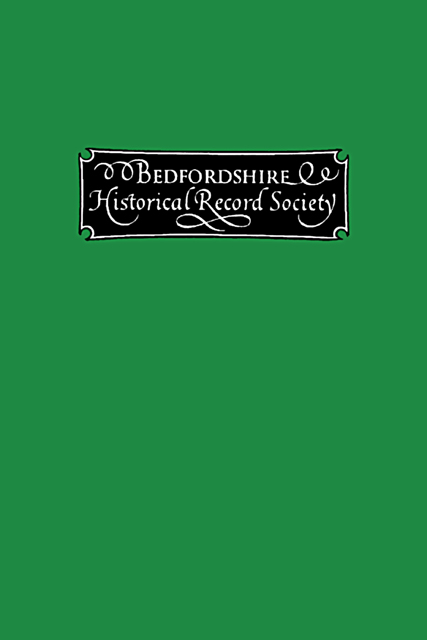Book contents
- Frontmatter
- Contents
- Rules For Transcription
- The Beauchamps, Barons of Bedford, by C. Gore Chambers
- Clerical Subsidies in the Archdeaconry of Bedford, 1390-2 and 1400-II
- Domesday Notes
- A Lease of Caddington Manor in 1299
- Sir William Harper, Knight
- Early Charters of the Priory of Chicksand
- Notes on Two Trades
- The Bedford Eyre, 1202
- Records of Northill College. No. I
- Index
Early Charters of the Priory of Chicksand
Published online by Cambridge University Press: 14 July 2023
- Frontmatter
- Contents
- Rules For Transcription
- The Beauchamps, Barons of Bedford, by C. Gore Chambers
- Clerical Subsidies in the Archdeaconry of Bedford, 1390-2 and 1400-II
- Domesday Notes
- A Lease of Caddington Manor in 1299
- Sir William Harper, Knight
- Early Charters of the Priory of Chicksand
- Notes on Two Trades
- The Bedford Eyre, 1202
- Records of Northill College. No. I
- Index
Summary
Little material for the early history of Chicksand has as yet been published; indeed, it is doubtful whether much is extant. With the greater pleasure I lit accidentally on copies of twenty-one early charters to this House, which seem to have escaped notice. When pleading in 1402-3 for exemption from payment to a clerical subsidy on the ground of poverty, the Priory gave a list of its property, the amount at which it was taxed, and the history of its acquisition; under the last were enrolled, in full, copies of the charters of the lands concerned. The entry is a long one, covering four membranes on both sides. In the following pages the pleading has been abstracted, and very slightly rearranged. A full transcript did not seem to be necessary, since the roll is accessible to all students at the Record Office. Two charters have been transcribed in full, and one given with slight omissions, on account of their early date, and of the importance of the grantors. A first attempt to date these charters has been made, but several can only satisfactorily be dated when the early history of the county has become better known.
When the Collectors of the Tenth and half-Tenth granted by the clergy of the province of Canterbury on 21 October, 4 Henry iv. [1402-3], were accounting at the Exchequer, special mention was made that nothing should be exacted from the benefices of poor nuns and hospitallars. There came the nuns of Chicksand by their attorney Henry Wybbe, and complained that they were gravely distressed and disquieted by the Collectors of the Tenth and half-Tenth aforesaid, in the following archdeaconries:—
Then follow in full charters by which the above possessions were granted to the Priory. The first of these, given by Payn de Beauchamp of Bedford, and the Countess Rohese, his wife, widow of the great Geoffrey de Mandeville, has been already printed in Dugdale’s Monasticon Anglicanum, vj. 950; and is Harl. Charter 45, I., 7, of the British Museum; it can be dated as between 1147 and 1153; and the Museum copy appears to be contemporary.
- Type
- Chapter
- Information
- The Publications of the Bedfordshire Historical Record Society , pp. 101 - 128Publisher: Boydell & BrewerFirst published in: 2023



